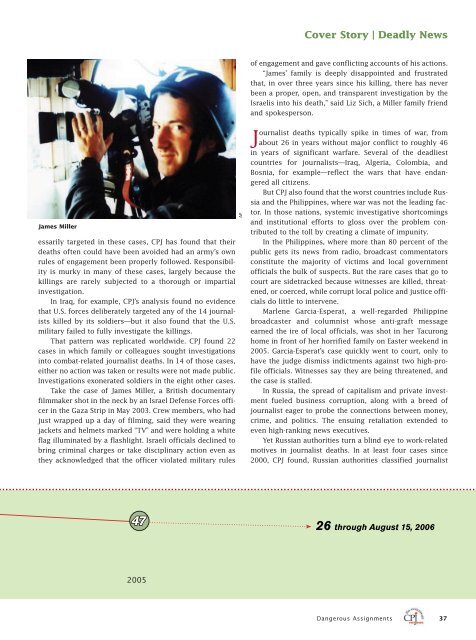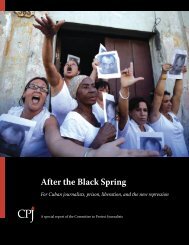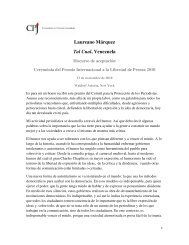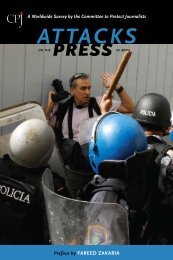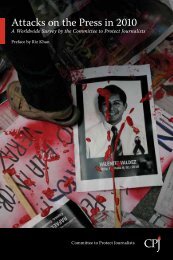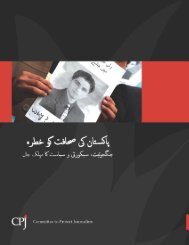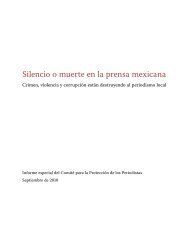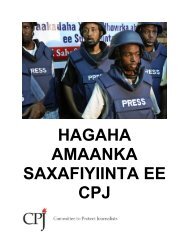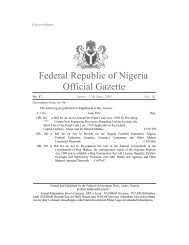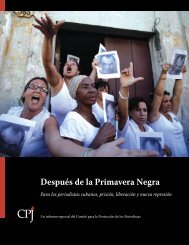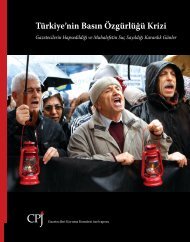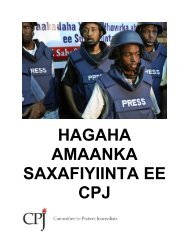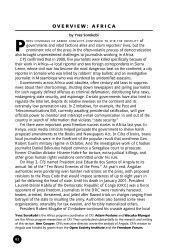Read the magazine online (PDF) - Committee to Protect Journalists
Read the magazine online (PDF) - Committee to Protect Journalists
Read the magazine online (PDF) - Committee to Protect Journalists
Create successful ePaper yourself
Turn your PDF publications into a flip-book with our unique Google optimized e-Paper software.
Mission Journal | A Look Back<br />
The First Trip<br />
During a 1982 mission <strong>to</strong> Central America, a delegation found turmoil within<br />
and all around.<br />
By Michael Massing<br />
To this day, when I think back <strong>to</strong> CPJ’s first mission,<br />
<strong>to</strong> Central America in March 1982, I feel slightly<br />
queasy. It’s not so much because of <strong>the</strong> turbulence<br />
we found on <strong>the</strong> ground—<strong>the</strong> state of emergency in<br />
Nicaragua, <strong>the</strong> killings of four Dutch journalists in El Salvador,<br />
<strong>the</strong> rampant activities of <strong>the</strong> death squads in<br />
Guatemala. No, it was <strong>the</strong> tension within our delegation<br />
that I most vividly recall.<br />
At <strong>the</strong> time, Central America was <strong>the</strong> most dangerous<br />
place in <strong>the</strong> world <strong>to</strong> be a journalist, and, although CPJ was<br />
barely a year old, we felt we had <strong>to</strong> do something dramatic<br />
<strong>to</strong> publicize <strong>the</strong> risks <strong>the</strong>re. I was working full-time as an<br />
edi<strong>to</strong>r at <strong>the</strong> Columbia Journalism Review, but since CPJ had<br />
but one part-time staff member it fell <strong>to</strong> me <strong>to</strong> handle <strong>the</strong><br />
preparations. Arranging meetings and accommodations in<br />
<strong>the</strong> three countries was taxing in that era before e-mail, but<br />
Michael Massing is co-founder of CPJ and a current board<br />
member. A contribu<strong>to</strong>r <strong>to</strong> numerous publications, he is <strong>the</strong><br />
author of Now They Tell Us (New York Review Books, 2004), a<br />
collection of articles about press coverage of <strong>the</strong> war in Iraq.<br />
choosing members of <strong>the</strong> delegation proved <strong>to</strong> be <strong>the</strong> real<br />
challenge. Our first recruit was Gloria Emerson, a former<br />
correspondent for The New York Times and author of Winners<br />
and Losers, a book about U.S. involvement in Vietnam;<br />
Emerson had been in frequent <strong>to</strong>uch with CPJ about Central<br />
America and badly wanted <strong>to</strong> go. At her urging, we also<br />
invited Jonathan Larsen, a senior edi<strong>to</strong>r at Life <strong>magazine</strong><br />
who had covered Vietnam for Time; he, <strong>to</strong>o, signed on. Also<br />
agreeing <strong>to</strong> participate were Randolph Ryan, an edi<strong>to</strong>rial<br />
writer at The Bos<strong>to</strong>n Globe, and George Watson, a vice president<br />
of ABC News.<br />
At five people, <strong>the</strong> delegation was already quite large,<br />
but <strong>the</strong>re was a sense that we needed one more person,<br />
someone who might help us gain <strong>the</strong> ear of <strong>the</strong> U.S. government.<br />
The Reagan administration had declared Central<br />
America <strong>the</strong> prime battleground in <strong>the</strong> struggle against<br />
Soviet expansionism and, under <strong>the</strong> direction of Assistant<br />
Secretary of State Elliott Abrams, was seeking <strong>to</strong> isolate <strong>the</strong><br />
Sandinistas in Nicaragua, prop up <strong>the</strong> government of José<br />
Napoléon Duarte Fuentes in El Salvador, and shield <strong>the</strong><br />
CPJ<br />
Anne Nelson, left,<br />
CPJ’s mission<br />
coordina<strong>to</strong>r, and<br />
Jonathan Larsen, a<br />
senior edi<strong>to</strong>r at Life<br />
<strong>magazine</strong>, at <strong>the</strong><br />
human rights office<br />
of <strong>the</strong> Salvadoran<br />
archbishop.<br />
Guatemalan junta from criticism. We hoped that our mission,<br />
by highlighting <strong>the</strong> dangers that journalists in all<br />
three countries faced, could prod Washing<strong>to</strong>n in<strong>to</strong> using its<br />
influence on <strong>the</strong>ir behalf. To accomplish that, though, we<br />
felt we needed <strong>to</strong> show that we weren’t just a bunch of<br />
knee-jerk liberals. And so, after many phone calls and consultations,<br />
we invited Allen Weinstein <strong>to</strong> join us.<br />
Weinstein was executive edi<strong>to</strong>r of The Washing<strong>to</strong>n Quarterly,<br />
published by <strong>the</strong> Center for Strategic and International<br />
Studies at George<strong>to</strong>wn University. Aside from a year<br />
as a member of <strong>the</strong> edi<strong>to</strong>rial board of The Washing<strong>to</strong>n Post,<br />
he had spent most of his career in academia. He was best<br />
known for his book Perjury: The Hiss-Chambers Case, in<br />
which he had sought <strong>to</strong> prove that Alger Hiss was a Soviet<br />
spy, and which had stirred much controversy. Weinstein<br />
had close ties <strong>to</strong> <strong>the</strong> administration, and, by adding him, we<br />
hoped <strong>to</strong> get its attention. He was eager <strong>to</strong> go but insisted<br />
on bringing his wife, a Washing<strong>to</strong>n lawyer who spoke Spanish<br />
and whose political views were, if anything, even more<br />
stalwart. We felt we had no choice but <strong>to</strong> go along, and so<br />
she joined <strong>the</strong> delegation as an unofficial member.<br />
The squabbling began from <strong>the</strong> moment we landed in<br />
Managua. The political divisions over U.S. policy in <strong>the</strong><br />
region were so sharp that <strong>the</strong>y kept intruding on our internal<br />
discussions. None<strong>the</strong>less, we had a series of remarkable and<br />
revealing meetings. On a visit <strong>to</strong> <strong>the</strong> offices of La Prensa,<br />
<strong>the</strong> newspaper that had helped bring down <strong>the</strong> dicta<strong>to</strong>r<br />
Anastasio Somoza Debayle, we got a firsthand look at <strong>the</strong><br />
arbitrariness of <strong>the</strong> prior censorship that <strong>the</strong> Sandinistas<br />
had imposed on <strong>the</strong> press. We arrived as that day’s edition<br />
was being prepared, and <strong>the</strong> edi<strong>to</strong>r, Pedro Joaquin Chamorro<br />
Jr.—son of <strong>the</strong> legendary publisher who had been assassinated<br />
by Somoza’s thugs in 1978—informed us that <strong>the</strong><br />
edi<strong>to</strong>rial page had already been sent <strong>to</strong> <strong>the</strong> government<br />
three times for inspection. The censors ended up banning<br />
an article analyzing <strong>the</strong> mistrust between <strong>the</strong> superpowers,<br />
a pho<strong>to</strong> of children playing in <strong>the</strong> charred remains of a bus<br />
destroyed by guerrillas in El Salvador, and a letter <strong>to</strong> <strong>the</strong> edi<strong>to</strong>r<br />
about protecting <strong>the</strong> country’s wildlife. Across <strong>to</strong>wn, in<br />
<strong>the</strong> offices of Barricada, <strong>the</strong> official organ of <strong>the</strong> Sandinista<br />
Front, Pedro’s bro<strong>the</strong>r, Carlos Fernando Chamorro, defended<br />
<strong>the</strong> government’s clampdown on <strong>the</strong> paper that his family<br />
had so long owned, arguing that it used language that lent<br />
legitimacy <strong>to</strong> counterrevolutionary groups. Thus had <strong>the</strong><br />
revolution split Nicaragua’s leading journalistic family.<br />
We arrived in El Salvador on <strong>the</strong> eve of a national election<br />
that <strong>the</strong> Reagan administration was <strong>to</strong>uting as an important<br />
step on <strong>the</strong> road <strong>to</strong> democracy, and more than 700 journalists<br />
had come <strong>to</strong> cover it. I have a vivid memory of Tom<br />
Brokaw broadcasting from outside a polling place in San Salvador.<br />
Yet <strong>the</strong> working conditions for journalists—both local<br />
and international—remained precarious. Twenty-two journalists<br />
(not including <strong>the</strong> four Dutchmen) had been killed in<br />
circumstances o<strong>the</strong>r than combat, and many more had been<br />
AP<br />
wounded, threatened, or assaulted. Everywhere journalists<br />
went, <strong>the</strong>y were greeted by chants of Di la verdad—tell <strong>the</strong><br />
truth. Shortly before our arrival, <strong>the</strong> right-wing Arena party<br />
had broadcast a campaign ad criticizing New York Times<br />
reporter Warren Hoge by name. (In a meeting in his room at<br />
<strong>the</strong> Camino Real Hotel, Hoge expressed unconcern.) We met<br />
with two of <strong>the</strong> men thought <strong>to</strong> be most responsible for <strong>the</strong><br />
attacks on journalists—Arena leader Rober<strong>to</strong> d’Aubuisson,<br />
who was widely believed <strong>to</strong> be linked <strong>to</strong> <strong>the</strong> death squads,<br />
and Gen. José Guillermo García, <strong>the</strong> direc<strong>to</strong>r of <strong>the</strong> national<br />
police. Both promised that after <strong>the</strong> election <strong>the</strong>y would<br />
issue statements calling for <strong>the</strong> rights of journalists <strong>to</strong> be<br />
respected. (Nei<strong>the</strong>r did.) The depth of <strong>the</strong> animosity <strong>to</strong>ward<br />
<strong>the</strong> press became clear <strong>to</strong> us at a tense meeting with <strong>the</strong><br />
country’s leading business group. One wealthy industrialist<br />
denounced The New York Times, The Washing<strong>to</strong>n Post, Time,<br />
and Newsweek for <strong>the</strong> harm <strong>the</strong>y had done El Salvador’s<br />
image. We pointed out that it was not journalists who had<br />
caused <strong>the</strong> deaths of tens of thousands of Salvadorans. Over<br />
cocktails at <strong>the</strong> residence of U.S. Ambassador Deane Hin<strong>to</strong>n,<br />
we shared our concerns about <strong>the</strong> dangers journalists faced.<br />
He cavalierly brushed <strong>the</strong>m aside. The Salvadoran press was<br />
“incredibly free,” he declared. As for <strong>the</strong> dead Dutchmen, he<br />
said gruffly, “War correspondents run risks. They ran a risk.<br />
It’s a rough country.”<br />
In El Salvador, Arena leader Rober<strong>to</strong> d’Aubuisson and police<br />
head Gen. José Guillermo García promised <strong>to</strong> publicly support<br />
<strong>the</strong> rights of journalists. Nei<strong>the</strong>r did.<br />
AP/Kathy Willens<br />
While we were in El Salvador, we learned that <strong>the</strong> government<br />
of Fernando Romeo Lucas García in Guatemala had<br />
been overthrown in a coup. But <strong>the</strong> capital, Guatemala City,<br />
seemed calm, so we continued <strong>the</strong>re. The coup had brought<br />
<strong>to</strong> power ano<strong>the</strong>r general, Efrain Rios Montt, but <strong>the</strong> regime<br />
he replaced had been so savage that journalists were allowing<br />
<strong>the</strong>mselves a moment of optimism. At <strong>the</strong> offices of<br />
Diario El Gráfico, one of <strong>the</strong> country’s two main papers, a <strong>to</strong>p<br />
edi<strong>to</strong>r <strong>to</strong>ld us how under Lucas García he had feared attack<br />
from both right-wing death squads and leftist guerrillas. “We<br />
were <strong>the</strong> ham of <strong>the</strong> sandwich,” he said. With a new government<br />
in place, he was feeling somewhat more relaxed. For<br />
<strong>the</strong> first time in four years, <strong>the</strong> paper’s edi<strong>to</strong>r was signing<br />
his name <strong>to</strong> edi<strong>to</strong>rials. He ended <strong>the</strong> meeting on a note of<br />
74 Fall | Winter 2006<br />
Dangerous Assignments<br />
75


